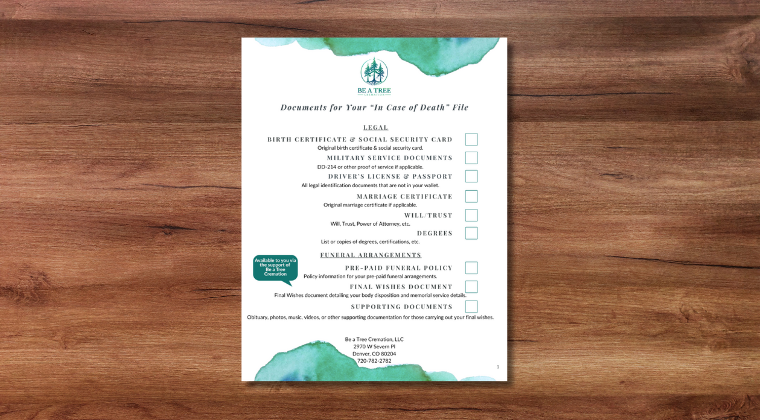What documents should I have in my “In Case of Death” file?
A Complete Guide to Preparing Your “In Case of Death” File
No one likes to think about death — their own or a loved one’s. But planning ahead is one of the most profound gifts you can leave for your family. When a death occurs, there are countless decisions to make and important papers to locate. Having the right documents prepared and organized in advance can bring tremendous peace of mind to your family during an emotionally difficult time.
This article will guide you through exactly what documents you should have in case of death, why each one matters, and how to organize them so your loved ones can easily find everything they need. At the end, you’ll be able to download Be a Tree Cremation’s free Document Checklist for Loved Ones — a practical tool designed to simplify this process.
Disclaimer: This is intended to be a helpful resource and not legal advice. Contact an attorney for guidance regarding your specific situation.
Why Having an “In Case of Death” File Matters
When someone passes away, their loved ones are suddenly responsible for legal, financial, and logistical matters — often while grieving deeply. Locating critical paperwork like wills, insurance policies, or even passwords can become an overwhelming task.
An organized “In Case of Death” file ensures your family can:
Access your important records immediately
Follow your wishes accurately and respectfully
Avoid delays in funeral planning and estate settlement
Prevent financial or legal complications
Focus on celebrating your life, not sorting through paperwork
At Be a Tree Cremation, we’ve seen firsthand how meaningful it is when families have everything ready. It’s an act of love — one that offers clarity, compassion, and calm during a time of uncertainty.
How to Organize Your Documents
Before diving into the specific documents, it’s important to decide how you’ll store and share them.
Use a clearly labeled folder or binder: Title it “In Case of Death File.”
Keep physical copies of legal documents, alongside digital versions in a password-protected folder or cloud account.
Tell trusted people — such as your next of kin, executor, or Power of Attorney — where this file is located and how to access it.
Update it annually or whenever your life circumstances change (new marriage, new home, policy changes, etc.).
Your file should include four main sections: Legal, Financial, Household/Digital, and Medical. Let’s explore what goes in each.
Legal Documents
Legal records are the backbone of your “In Case of Death” file. They guide how your estate will be handled, confirm your identity, and document your final wishes.
1. Birth Certificate and Social Security Card
Your original birth certificate and Social Security card help verify your identity for everything from insurance claims to closing accounts.
2. Marriage Certificate (if applicable)
This verifies your marital status for estate settlement, survivor benefits, and name changes on official accounts.
3. Military Service Documents (if applicable)
If you’ve served in the armed forces, include your DD-214 or equivalent proof of service. This document is essential for accessing burial benefits, military honors, or survivor pensions.
4. Will and/or Trust
Your Last Will and Testament spells out how your assets should be distributed. A Trust may help avoid probate and protect your estate’s privacy. Make sure the original, signed versions are accessible, and that your executor knows where to find them.
5. Power of Attorney (POA)
A Power of Attorney document authorizes someone you trust to make financial or legal decisions if you become incapacitated. Ensure you have copies for both financial and healthcare powers of attorney, and that they are up to date.
6. Funeral or Final Wishes Document
This is one of the most compassionate gifts you can leave behind. A Final Wishes document details your preferences for body disposition (for example, water cremation, traditional cremation, or burial) and the type of memorial service you’d like.
At Be a Tree Cremation, we encourage including meaningful details such as:
Preferred music, readings, or rituals
Whether you’d like a memorial tree planted or ashes scattered in nature
People you’d like notified or involved
7. Pre-Paid Funeral Policy or Arrangement Information
If you’ve pre-planned or pre-paid for your funeral or cremation, include all policy documents and contact details for the provider. Having these records ready spares your family both confusion and financial stress.
8. Supporting Documents
Gather obituary drafts, photos, videos, and any personal notes or letters to loved ones. These help your family create a meaningful remembrance that truly reflects your life.
9. Driver’s License and Passport
Keep copies of official identification that are not typically carried in your wallet. These may be required for legal filings or to verify identity when closing accounts.
10. Degrees and Certifications
These aren’t legally required, but they can be helpful for writing obituaries, applying for benefits, or organizing professional legacies.
Financial Documents
Your financial section should make it easy for your executor or loved ones to locate accounts, pay bills, and settle debts.
1. Bank Accounts
List all bank accounts, along with account numbers, financial institution names, and contact information. Include online banking login credentials if applicable.
2. Investment Accounts
Provide details for 401(k)s, IRAs, brokerage accounts, and any other investments. Note the institutions, account numbers, and beneficiary information.
3. Mortgage or Lease Documents
Include mortgage statements, property deeds, leases, or appraisal documents. If you make payments online, list login credentials to ensure bills are managed promptly.
4. Insurance Policies
Include policies for:
Life insurance
Disability insurance
Homeowners or renters insurance
Property or vehicle insurance
Having these documents ensures your family can file claims efficiently.
5. Tax Returns
Keep the last five years of federal and state tax returns. These are often needed for estate administration and may simplify future filings.
6. Credit Cards
Provide account numbers, card issuers, and (if safe to do so) login information to close accounts or pay final balances.
7. Vehicle Titles and Financing Records
Include the original titles, financing documents, and any maintenance or repair records. This helps your family manage ownership transfers or sales.
8. Safe Deposit Boxes
If you maintain one, include the location, key, and bank information. Make sure someone you trust knows how to access it.
Household and Digital Documents
Modern life extends far beyond paper — so your “In Case of Death” file should cover both your household operations and digital life.
1. Utility Accounts
List all utility providers and account numbers — electric, gas, water, internet, and trash services — along with online login information. This will help your family manage ongoing payments or cancellations.
2. Home Inventory
Create a brief inventory of valuable or sentimental belongings (furniture, jewelry, artwork, tools, heirlooms). This list helps with both insurance claims and estate division.
3. Smartphone Information
Write down or securely store the password to your smartphone and associated Apple ID or Google account login. These may be needed to access contacts, photos, and other important data.
4. Social Media Logins
Include usernames and passwords for social media accounts like Facebook, Instagram, LinkedIn, or X (Twitter). Many platforms allow memorialization or account deletion upon proof of death — having this info makes that process simple.
5. Digital Photos and Cloud Storage
Note where your digital photos are stored — whether that’s iCloud, Google Photos, Dropbox, or a flash drive. These digital memories are often the most cherished.
6. Other Online Accounts
Include streaming services, online shopping (like Amazon), email logins, and subscription accounts. Consider using a password manager to securely store everything in one place and share access with your executor.
7. Pet Information
Don’t forget your furry or feathered family members. Include veterinary records, microchip info, and an adoption or rehoming plan for each pet.
Medical Documents
Your medical information ensures continuity of care during your lifetime and honors your health preferences at the end of it.
1. Medical Insurance
Keep all health, dental, vision, and supplemental insurance cards and policy details together for easy reference.
2. Medical Records
Include summaries of immunizations, medications, allergies, major surgeries, and hospitalizations. This can be especially helpful if you have ongoing treatments or chronic conditions.
3. Advance Healthcare Directive
Sometimes called a Living Will, this document outlines your healthcare wishes if you cannot speak for yourself. It can include directions about life support, resuscitation, or palliative care.
4. Organ and Body Donation Information
If you’re registered as an organ, tissue, or whole-body donor, include your donor card, registration confirmation, or written instructions.
At Be a Tree Cremation, many families also include requests for eco-friendly body disposition, such as water cremation or memorial forest donation, as part of their medical and ethical wishes.
How to Communicate and Store Your Documents Safely
Once you’ve gathered everything, proper storage and communication are key.
1. Keep It Organized
Use labeled sections (Legal, Financial, Household, Medical) in a binder or accordion folder. Place documents in protective sleeves.
2. Choose a Secure Location
Consider a fireproof safe, safe deposit box, or encrypted digital vault. Your executor or trusted loved one should have the key or password.
3. Share Selectively
Only a few people need full access — typically your executor, spouse, and Power of Attorney. Share limited documents (like your final wishes) with others as needed.
4. Review and Update Regularly
Set a reminder to review your file annually. Update it after major life events — marriages, births, moves, or policy changes.
Beyond Documents: Emotional and Legacy Planning
Paperwork isn’t the only way to prepare your loved ones. Many families include letters, reflections, or recordings in their file — messages that offer guidance, gratitude, or love.
You might consider writing:
A letter to your children or grandchildren
Reflections on your life’s values and lessons
Favorite memories or stories you’d like passed down
Your hopes for how you’d like to be remembered
These personal touches make your “In Case of Death” file a lasting legacy of love, not just logistics.
Eco-Conscious End-of-Life Planning
If sustainability is part of your life’s values, your final arrangements can reflect that too. Be a Tree Cremation offers eco-friendly funeral options like water cremation (alkaline hydrolysis) — a gentle and environmentally responsible process that uses 90% less energy than fire cremation and avoids harmful emissions.
Including your eco-conscious choices in your Final Wishes document ensures that your legacy aligns with your love for nature and future generations.
Download the Free Checklist
To make this process easier, Be a Tree Cremation has created a comprehensive Document Checklist for Loved Ones — a printable guide that mirrors everything discussed here. It walks you step-by-step through each category so you can feel confident your affairs are in order.
Whether you’re planning for yourself or helping a loved one organize their information, this resource simplifies what can feel like a daunting task. Within a few hours, you’ll have peace of mind knowing that everything your family needs is secure, complete, and ready.
Final Thoughts: The Gift of Preparation
Preparing an “In Case of Death” file isn’t about fearing the inevitable — it’s about embracing responsibility, love, and peace. It’s a tangible way to protect your family, honor your values, and ensure that even after you’re gone, your care continues to guide them.
At Be a Tree Cremation, we believe that end-of-life planning can be a natural, compassionate part of life — one that brings clarity, not dread; connection, not confusion.
By organizing these documents today, you’re leaving behind more than paper — you’re leaving a legacy of kindness, order, and thoughtfulness that will help your loved ones navigate tomorrow with grace.
🌿 Ready to Begin?
Download the Checklist, gather your records, and take the first step toward peace of mind.
If you’d like help with planning your eco-friendly arrangements or final wishes, our compassionate team is here to guide you every step of the way.
📞 Call Be a Tree Cremation at 720-782-2782
🗓️ Attend An Upcoming Event or Open House



